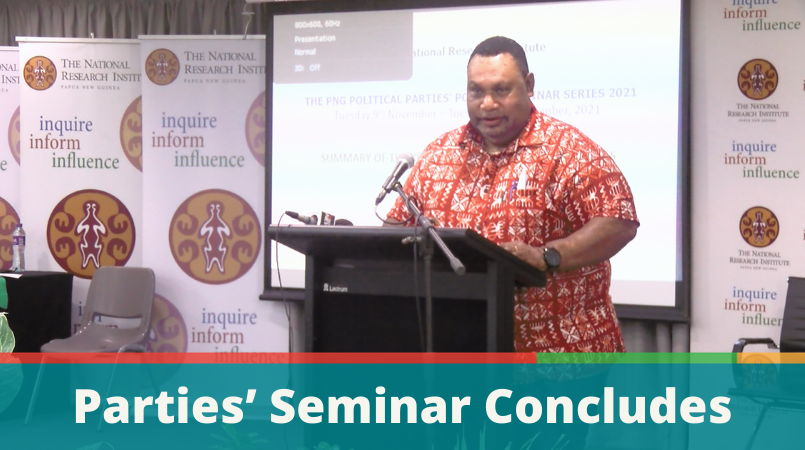
The Papua New Guinea Political Parties’ Policies Seminar Series 2021 concluded yesterday, Tuesday 21 December 2021, at the Papua New Guinea National Research Institute (PNG NRI) in Port Moresby.
All 46 registered political parties at the time were given invitations to present the policies of their political parties over the course of six weeks. Only 26 accepted the invitation and utilized the opportunity to present their policies. That was, 50 percent of all political parties.
PNG NRI, the Registry of Political Parties with the support of the PNG-Australia Governance Partnership Program and the National Broadcasting Corporation, jointly organized the seminar series.
Present at the occasion was Director of PNG NRI, Dr. Osborne Sanida, Acting Director, Policy and Legal of the Integrity of Political Parties and Candidates Commission (IPPCC), Solomon Puana and PNG NRI Council Chairman, Wilson Thompson.
At the closing event yesterday, moderator of the seminar series, Dr. Lawrence Sause presented the key points from presentations and discussions that took place over the course of the six weeks. He summarized the main observations, common themes and useful insights gathered from the dialogue that took place in the seminar series.
Dr. Sause highlighted that the number of parties has risen from 46 in October this year to 52 currently. Among these parties, there are four dominant parties; PANGU Pati, United Labour Party, PNG Party and the National Alliance.
Another dominant party, the People’s National Congress (PNC) was absent and didn’t present their policies.
Dr. Sause said attracting mass voter support for candidates based on political party policy continues to be a challenge for the political parties and thus institutionalizing these parties with long-term strong and stable support across the country continues to also be a challenge.
Other problems highlighted included the lack of presence of political parties in provinces and districts across PNG, the increasing population of ill-informed voters and the disconnect between parties and the voters.
This can be easily explained by analyzing the trend of voters electing political leaders for reasons such as personality, affiliations, personal and familial ties, clan relations, wealth etc. and not for reasons of policies under which party a candidate is affiliated to.
Broadly, the seminar series was aimed at the awareness and promotion of political parties to the PNG population in an effort to strengthen political parties, educate voters and get voters to vote candidates on policies, in anticipation for the National General Elections (NGE) in 2022.
It also aimed at encouraging understanding, partnership and cooperation between political parties and key parties responsible for the governance of political parties and the conduct of the NGE 2022.
Some observations of the seminar series are as follows;
- Some parties are more serious in crafting policy while others are not,
- Few heavily faith-based parties, appearing to merge church and state interests together, or intend to run the state based on religious beliefs, determining clear policy priorities linked to clear goals and outcomes and;
- Defining robust strategies to achieve them is an ongoing challenge for political parties.
A seminar proceedings report will be produced and disseminated for public use once compiled on conclusion of the seminar series.
Dr. Sanida in his remarks shared his observations of the seminar series.
“One that I wish to repeat with a twist is that we live in very challenging times because of change. Across the world, political parties have a role to play in addressing issues brought about by some form of change no matter what side of parliament they sit. PNG is no exception.”
He said the seminar series has contributed to highlighting and strengthening the role of political parties and policies to address the various challenges in PNG brought about by economic, social and environmental changes.
